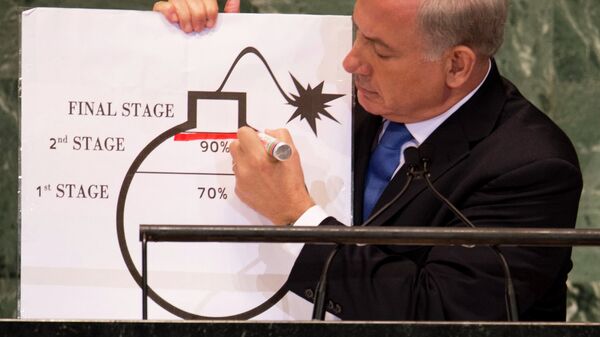The former chief of the Israeli spy agency Mossad, Tamir Pardo, has said that he had to check whether the actions of Prime Minister Netanyahu were legal in 2011 after he put the military forces on standby for a strike on Iran’s nuclear facilities. Netanyahu reportedly told an ex-chief of staff of the Israeli Defense Forces, Benny Gantz, that they should be prepared to carry on actions within 15 days after an order to strike.
According to Pardo, Netanyahu as well as Ehud Barak, who was the defense minister then, didn’t want to miss an opportunity to destroy the Iranian nuclear sites before the Islamic Republic of Iran could fortify them, amid fears that Tehran was close to producing a nuclear weapon.
Pardo confirmed in his interview with the Israeli broadcaster Keshet that if Netanyahu proceeded with his plan, it could have led to a war. However, he didn’t also exclude that the prime minister could have used this move as a warning signal.
“It’s possible that someone in the United States would hear about it in one form or another, and that would motivate him to do something,” the former spy said in the interview.
Shedding light on the details of this pivotal moment for the Middle East, Pardo told Keshet that he started checking the legality of Netanyahu's actions. He said that he had considered resigning had the prime minister declared war.
“I made inquiries about everything I could do. I checked with previous Mossad chiefs. I checked with legal advisers. I consulted anyone I could consult in order to understand who is authorized to give instructions about the whole issue of starting a war,” he said.
The Israeli head of state decided against the full-scale military actions after the IDF-chief of staff and the head of the military intelligence objected. Pardo, appointed the head of Mossad at the beginning of 2011, left office in 2016, succeeded by Yossi Cohen.
Meanwhile, Netanyahu’s threats to attack Iran prompted the US to establish the 2015 Joint Comprehensive Plan of Actions (JCPOA), as journalist Ronen Bergman stated in his book “Rise and Kill First: The Secret History of Israel’s Targeted Assassinations.” According to Bergman, this rhetoric caused panic in Washington and pushed it towards negotiations, which resulted in the lifting of anti-Iranian sanctions in exchange for Tehran curbing its nuclear missile program.
US President Donald Trump has been publicly criticizing the deal, made by the Obama administration, since his election campaign, and on May 8 he announced that the US would withdraw from it despite criticism from France, Germany, Russia, China and the EU, who also signed the 2015 Iran deal.
READ MORE: Ex-CIA Officer Estimates Impact of Netanyahu’s Intel on Trump Iran Decision
Opposing the deal, Israel has repeatedly accused Iran of working on the nuclear missile program despite the agreement. Just before Trump’s announcement, Benjamin Netanyahu made a presentation, claiming that Iran lied about its nuclear agreement, and presented thousands of documents, dubbed Tehran’s secret archive, as evidence.
Besides, Israel accuses the Islamic republic of entrenching in Yemen, Iraq, Lebanon and Syria in particular, where tensions have grown over recent months. The escalation coincided with Trump’s withdrawal from the Iran deal and the relocation of the US Embassy to Jerusalem, which remains an apple of discord in the Arab-Israeli conflict. In May, Tel-Aviv launched dozens of missiles on alleged Iranian positions in Syria in response to a purported Iranian rocket bombardment at Israel's frontline.
READ MORE: Netanyahu: We'll Strike at Iran Anywhere in Syria


